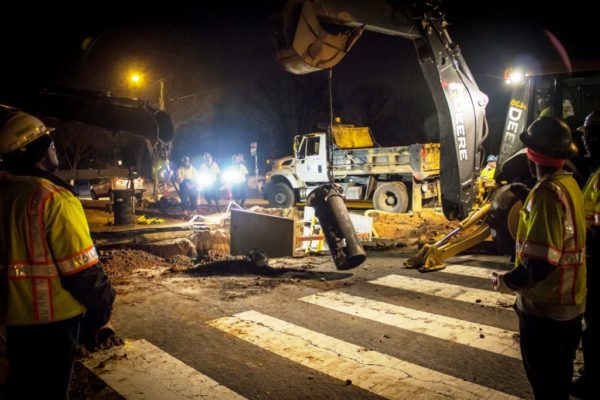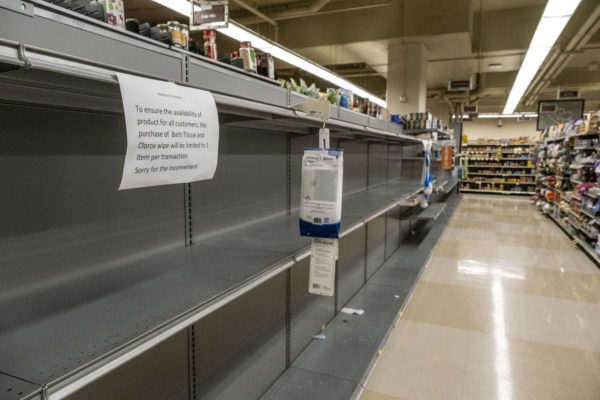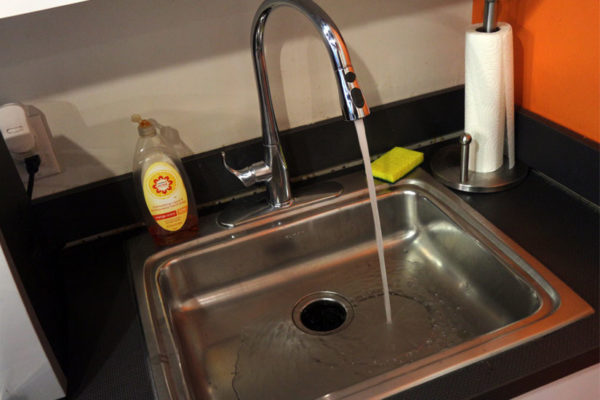Good news: you’re not going to get coronavirus from the tap water. But you could cause a big clog if you don’t watch what you flush.
That’s the message from the people who keep the water running in Arlington.
The county’s Dept. of Environmental Services is upping its public outreach to join other municipal water agencies in urging people not to flush wipes or anything else that is not “pee, poo or toilet paper.”
More from DES:
Plumbing and sewer lines – kept healthy – provide vital service to any community. Now more than ever, it’s essential to have such infrastructure flowing in Arlington.
When it comes to toilets, only three things that should ever be flushed. Two are those familiar human waste products. The other is genuine toilet paper.
Flushing down anything else threatens your home’s plumbing and, farther into the line, Arlington’s sanitary sewer system.
Disposable cleaning wipes, dental floss, cigarette butts, cat litter and more should always be thrown away. Those supposedly “flushable” hygiene wipes should also never be flushed. They fail to break down and can cause massive clogs.
Even paper towels and facial tissue can create jams because of their particular composition. Throw them away. Don’t flush them.
County spokesman Peter Golkin says no major clogs have been reported in Arlington so far, but the danger remains as people continue to use wipes amid a toilet paper shortage. And that’s not to mention disinfectant wipes that are unadvisedly disposed of in the toilet.
DES is also reminding residents to avoid sending fats, oils and grease down the sink, which coats and clogs pipes.
“Folks just need to take some simple steps to protect their own plumbing and the county’s,” said Golkin. “Put a trash can in the bathroom if you don’t have one and keep an empty metal can beside the stove for fats, oils and grease. Let it cool. Throw it in the trash.”
Separately, officials are assuring residents that Arlington’s tap water is safe, even during the outbreak.
There is no risk of virus transmission through the region’s public water systems. Disinfectants used in the region’s water treatment, like chlorine, neutralize the virus that causes COVID-19. Conventional water treatment methods also use filtration.
The region’s drinking water continues to meet all safety standards established by the federal Environmental Protection Agency and Virginia Department of Health.
Also, a reminder: the annual spring water disinfectant switch will be happening next week as scheduled. From DES:
The District of Columbia, Arlington County and northeastern Fairfax County will clean out their tap water network starting Monday — a safe, annual process.
Service continues uninterrupted during the process, which runs from March 30 through May 4. During that time, drinking water in the may taste slightly different. But the purification process remains unchanged and the water is essentially unchanged.
The U.S. Army Corps of Engineers’ Washington Aqueduct performs the temporary disinfectant switch from chloramine to chlorine to help clean the pipes and maintain system flow. Washington Aqueduct continues to add a corrosion inhibitor during the process to reduce the potential release of lead in system pipes throughout the region.
During the cleaning, local water authorities will continually monitor the drinking water for safe chlorine levels as well as conduct system-wide flushing to enhance water quality. Concurrently, staff will start systematically flushing fire hydrants. This process is repeated nearly every spring, in the region and across the nation. Crews operating hydrants are a normal part of this routine.
This temporary cleaning often brings with it a new smell to tap water. If customers opt, they can run the cold water tap for about two minutes, use a water filter or let water sit in a container in the refrigerator to remove chlorine taste and odor.
Customers who take special precautions to remove chloramine from tap water should continue such methods during the temporary switch to chlorine. As always, those with special concerns should consult their health care provider.
The Washington Aqueduct is the wholesale water supplier for the District of Columbia, Arlington and northeastern Fairfax County.




